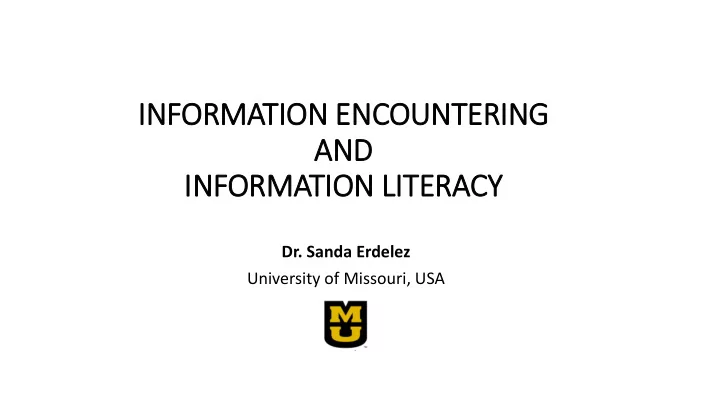

IN INFORMATION ENCOUNTERING AND IN INFORMATION LIT ITERACY Dr. Sanda Erdelez University of Missouri, USA
SERENDIPITY • Coined by Horace Walpole in 1754 • Faculty of making happy and unexpected discoveries by accident • Emerged as a focused research area in mid- 1990s • International group of 20+ researchers at all levels of academic career • Intensified research productivity in last 10 years
Term “serendipity” in SCOPUS database
Term “serendipity” in FACTIVA Database
Information Encountering Information Encountering is a type of serendipity that relates to human engagement (cognitive effort) with information.
Erdelez, Basic & Levitov study (2 (2011) • Kuhlthau's information search process (1985, 1989) • Eisenberg and Berkowitz' the Big6 ™ (1988, 1990) • Stripling and Pitts' research process model (1988) • Pappas and Tepe's pathways to knowledge model (1997) • Jamie McKenzie's research cycle (2000) Erdelez, S., Basic, J. & Levitov, D.D. (2011). "Potential for inclusion of information encountering within information literacy models" Information Research, 16(3) paper 489. [Available at http://InformationR.net/ir/16-3/paper489.html]
Stewart & Basic study (2 (2014) https://doi.org/10.1016/j.ijinfomgt.2013.10.007 • Survey of information encountering experiences of undergraduate students. • Survey questions were adopted from the information encountering scale developed by Wise & Erdelez (2012) and consisted of twelve questions focused on the Information encountering model • Students frequently encounter information while online, but were not capturing this information for future use using built-in, web-based tools. • While information literacy courses teach students to identify, seek, analyze, and use needed information, they do not prepare them to manage and retrieve unexpected Information encountered while using the Internet.
Frame 6: Searching as Strategic Exploration Searching for information is often nonlinear and iterative, requiring the evaluation of a range of information sources and the mental flexibility to pursue alternate avenues as new understanding Framework for Information Literacy develops. for Higher Education The act of searching often begins with a question that directs the act of finding needed information. 2015 Encompassing inquiry, discovery, and serendipity, searching identifies both possible relevant sources as well as the means to access those sources. Experts realize that information searching is a contextualized, complex experience that affects, and is affected by, the cognitive, affective, and social dimensions of the searcher. Novice learners may search a limited set of resources, while experts may search more broadly and deeply to determine the most appropriate information within the project scope. Likewise, novice learners tend to use few search strategies, while experts select from various search strategies, depending on the sources, scope, and context of the information need.
Research agenda • Integration of information encountering into information literacy training • Effect of information literacy training on information encountering. • Personal information management of encountered information • Crossover between information seeking and information encountering
Join me in promoting understanding and awareness about opportunities and challenges of information encountering ! erdelezs@missouri.edu @iesanda
Recommend
More recommend